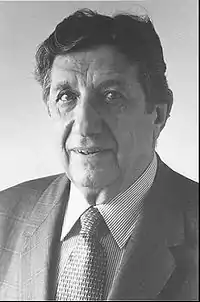Will Maslow
William Maslow (September 27, 1907 – February 23, 2007) was an American lawyer and civil rights leader who fought for full equality in a free society for Jews, blacks, and other minorities at positions he held in government and as an executive of the American Jewish Congress.

History
Born in Kiev, Russian Empire, Maslow came to the United States with his parents Raeesa and Saul Maslow (family name Masliankin) in 1911, and was raised primarily in Brooklyn, N.Y. After graduating from Boys High School Brooklyn, he won a state tuition scholarship to Cornell University, where he was a senior associate editor of the student paper, The Cornell Daily Sun, revived the Liberal Club, and, in 1929, graduated with an A.B. degree. Will Maslow and his cousin Abraham Maslow, who later became a pioneer in humanist psychology, were close friends at Boys High School.

Maslow received a law degree from Columbia University Law School in 1931. From 1931 to 1933, he worked part-time as a reporter for The New York Times, and was associated with the private law practice of Arthur Garfield Hays—who, at the time and for 29 years, was also the storied general counsel of the American Civil Liberties Union. Maslow then joined the New York City Department of Investigation as an associate counsel under commissioner Paul Blanshard in Mayor La Guardia's first administration. In 1937 he joined the National Labor Relations Board as a Trial Attorney in New York City and, in 1941, as an Administrative Law Judge based in Washington, D.C. In 1943 he was named Director of Field Operations for the President's Committee on Fair Employment Practice (FEPC), the agency responsible for investigating and resolving employment discrimination in wartime and government procurement contracts, and he served in that position until 1945.
In August 1945, Maslow returned to New York to become General Counsel of the American Jewish Congress, and Director of the American Jewish Congress's newly established Commission on Law and Social Action. He was Executive Director of AJCongress from 1960 until 1972. He continued to serve as general counsel of the agency until he retired in 1984. In retirement, he continued writing briefs and papers as a volunteer through the late 1990s.
Under his counsel and leadership, AJCongress was often in the courts challenging discrimination and advocating civil rights.[1] Maslow created the AJCongress' Commission on Law and Social Action and with it, filed a discrimination suit against Columbia University, demanding that it change its discriminatory admissions quotas. He also filed a suite against Stuyvesant Town Housing Co. because of its racial policies against black tenants.[2]
In 1947, he fought for strict adherence to the Ives-Quinn Law which forbade discrimination in employment, charging that job agencies were disregarding this law en masse, 88% in fact[3] He negotiated with Gertz, a department store in Jamaica, Queens, to hire blacks for the first time. "The negroes' fight against discrimination in employment, housing, education is part of the struggle for Jews for equality of opportunity in those fields.[4]"
Maslow helped organize Dr. Martin Luther King Jr.'s 1968 civil rights march on Washington, D.C. and the Little Rock school discrimination case in the 1950s.
References
- The Forward, "Law as Social Action: A Life in Advocacy - How One Man Changed the Rules", NATHANIEL POPPER, January 9, 2004
- Svonkin, Stuart (1997). Jews Against Prejudice:American Jews and the Fight for Civil Liberties (Book Site). New York: Columbia University Press. ISBN 0231106386.
- New York Times, Bias Survey Announced, February 18, 1947
- New York Sun, Will Maslow, 99, Civil Rights Crusader, STEPHEN MILLER,, February 26, 2007